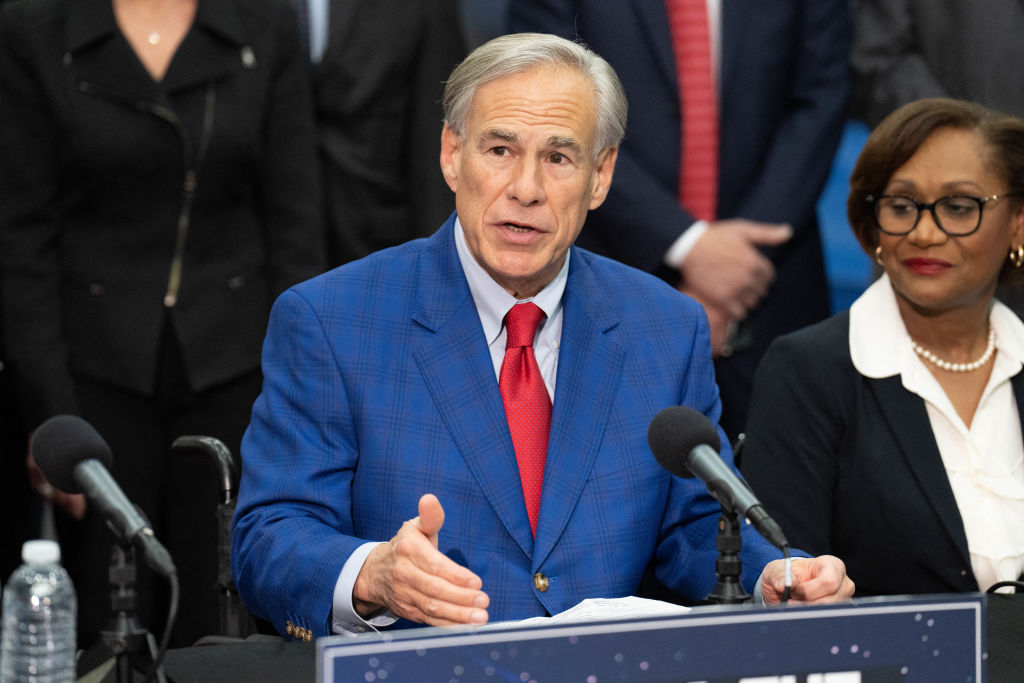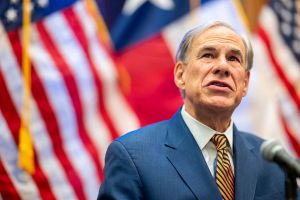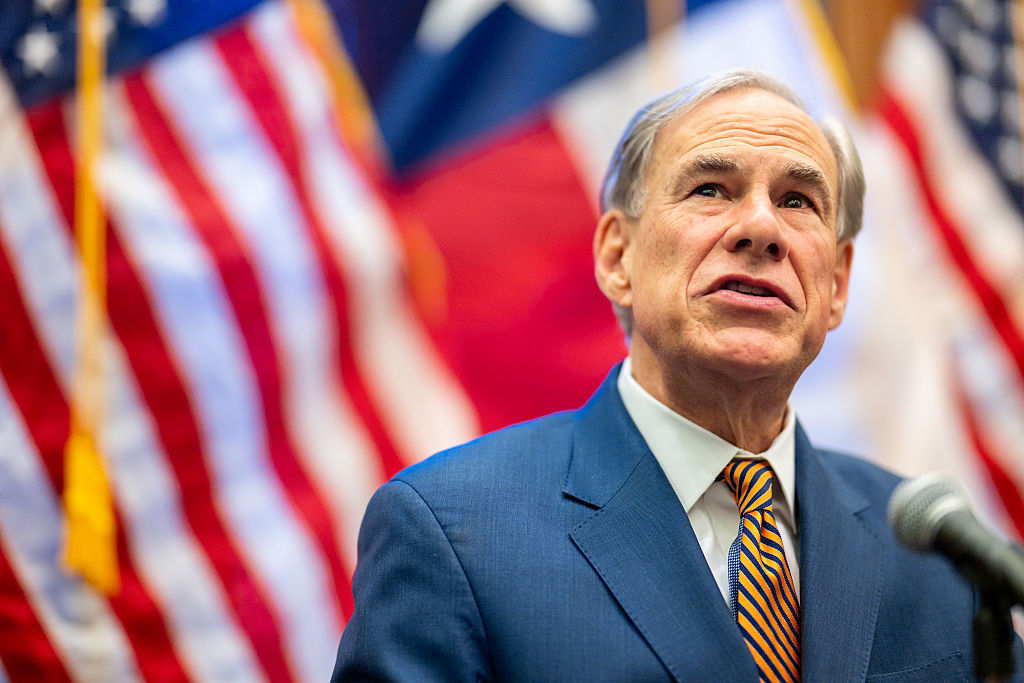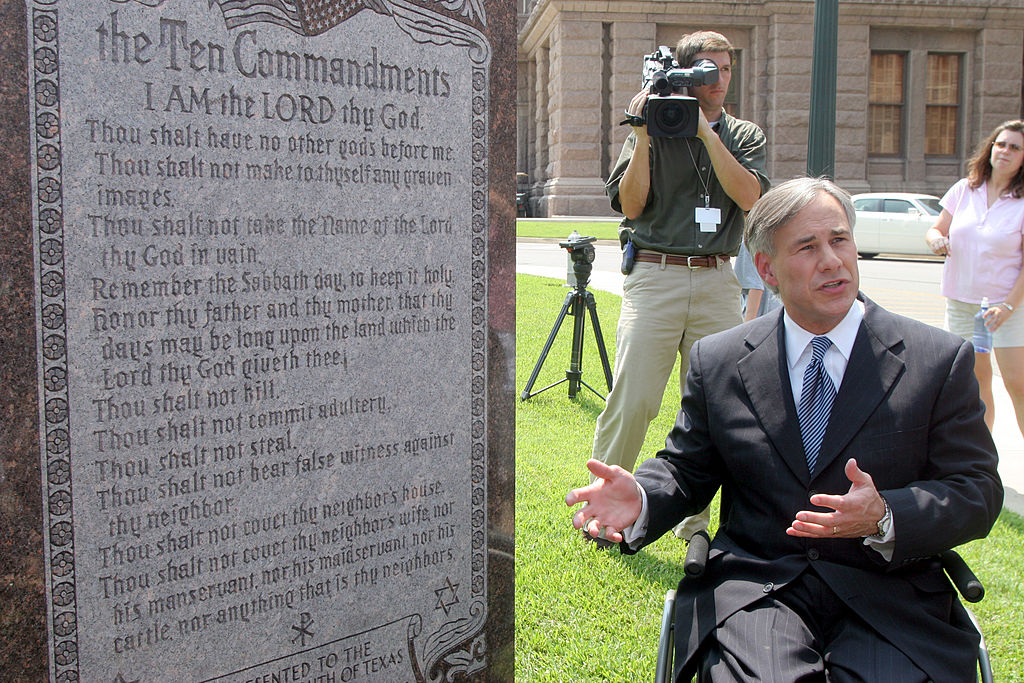“If there’s anyone who deserves impeachment, it’s Alejandro Mayorkas. Not only has he failed to enforce the law, he’s violated his oath of office with impunity.”
Greg Abbott is not mincing words. The Republican governor of Texas is at the center of the biggest issue on the minds of many 2024 voters — the border, where his policy clashes with Joe Biden’s White House and administration have become a focal point for Republican candidates nationwide and will be a major part of the 2024 Trump campaign. Multiple polls show the border/migrant issue to be top of mind for voters, especially for Republican-leaning independent voters — more on that below. No one has had to argue the border security issue more often and more publicly than Abbott, whose decision to bring the migrant crisis home to Democratic-run sanctuary cities is perhaps the most significant political move of the past two years.
I asked Abbott how he felt about the coverage of his decision to start sending migrants on buses out of state now, given that he was criticized at the time, even by some on the right, and if he feels vindicated now that it’s ultimately proven to be a political game changer.
“Everyone who criticized it, they were acting viscerally without any facts or knowledge about exactly what was going on,” Abbott said. “I was very simply trying to help small little communities — of 20,000 or 25,000 people, Del Rio, Eagle Pass and communities like that — be able to survive, because Joe Biden and his administration would drop off in these small little communities hundreds, if not thousands of people completely incapable of handling that number of people.”
“There were sent to locations that were self-identified as ‘sanctuary cities’ — they had a welcome sign that was open, they said they they wanted them there. So that was helping them live up to the commitment they made to the public by saying they wanted to be a sanctuary city,” Abbott said. “I was the one who was surprised to be honest. The politicians who said that they want to be sanctuary cities and when they showed up, they said ‘no, we don’t want these people here.’ There was more shock on my part about the duplicity, about the hypocrisy of the Democrat leadership. They were begging for illegal immigrants in a sanctuary city status, and then folded like a cheap tent when they actually had to live up to the commitment they made.”
I then asked Abbott what he thinks people need to know about the state of the border today, particularly things that don’t make it through the political noise about it.
“The Border Patrol numbers themselves about the number of people apprehended coming across the border show that Texas has been able to achieve a 72 percent reduction in the number of people crossing illegally, while at the very same time, there is a 24 percent increase in the number of people crossing illegally in the states that have put up no resistance whatsoever,” Abbott told me. The lesson? “There can be positive results achieved by showing resistance.”
For Abbott, Biden’s general hand-waving toward dealing with the border is massively insufficient compared to what needs to be done.
“We all know that Venezuela has allowed dangerous criminals out of their prisons into the United States of America. And you’ve seen the chaos caused by the rapes in Boston, in New York, by the murder of Laken Riley… the list is very long,” Abbott said. “What Biden must do as president, as the person in charge of national security, he must have his administration seek out and find every single person among the 9 million people he’s allowed in illegally who is a criminal, who has a criminal record, poses any danger whatsoever and deport them immediately.”
I also asked Abbott about the current ad campaign from the Biden re-election effort, which highlights the sad case of a woman who had a bad experience with Texas’s hospital system after the passage of their anti-abortion law — one which led to misinterpretation and avoidable crises. How does Abbott advise Republicans to navigate the abortion issue and make the case for unborn life in a climate where Democrats clearly want to make it the number one topic?
“Obviously, we advocate for protecting the life of the mother and the child. I went through this campaign process against Beto [O’Rourke]. The opinion came out about five months before the election against Beto. And what Republicans need to do is to do exactly what I did, and that is to go on the offense about it,” Abbott said. “Because Beto, like Biden, supports abortion up to the very last second before a fully developed child is born. They think that no one should tell anyone what to do with regard to an abortion of even a fully developed child. When the public hears a fully developed child that is on the way out the womb can be aborted, people are astonished about that. No one wants to see that type of killing of what is was a fully developed child. And so we need to make clear exactly the evil approach that the Democrats have with regard to killing fully developed babies.”
For Abbott, the commitment to the border issue isn’t just about political posturing or imagery — it’s about results.
“People are not able to grasp the magnitude of the presence of the Texas National Guard on the border,” Abbott said, noting that when former president Trump was visiting Eagle Pass, “[He] was astonished by the magnitude of the razor wire that was put up, that how effective of a barricade it provided and how it did look like a military had come in there and wired it shut — which they have. In Eagle Pass, before we wired Shelby Park shut, which is about fifty acres in size, there were some times as many as 5,000 people a day crossing there… From April 1 through the rest of the month, there’s been a total of eight people crossing the border there — an average of less than one a day.”
Why the border issue matters most
The WSJ outlines the reasons it’s now an even bigger concern for some than inflation.
The economy has always been the top issue at the ballot box for sixty-five-year-old Garfield Cousins. But this year Cousins, an independent voter in an Atlanta suburb, said the sustained surge of migrants at the southern border will for the first time drive his decision in a presidential election.
While illegal border crossings have repeatedly set records over the past few years, polls show a more recent sharp increase in the number of voters, like Cousins, who rank immigration as their top concern — even above the economy and inflation. Voters say they worry the migrant influx is affecting other aspects of life — from crime and fentanyl to national security and government spending — as Washington has been unable to resolve the problem.
“Although the economy is important, I see this also has an impact on the economy,” Cousins said, adding that taxpayers’ financial outlook is affected when cities make budget cuts to deal with the housing, food and healthcare costs associated with the influx of migrants.
A Wall Street Journal national poll conducted in late February found that 20 percent of voters now rank immigration as their top issue, up from 13 percent in December. In the same poll, 65 percent of voters said they disapproved of President Biden’s handling of border security, and 71 percent said developments in immigration and border security are headed in the wrong direction.
Another Journal survey conducted March 17-24 of registered voters in seven swing states — Arizona, Georgia, Michigan, Nevada, North Carolina, Pennsylvania and Wisconsin — found immigration to be among the top two issues in every state, with at least 72 percent of respondents in each of the states saying the country’s immigration policy and border security were headed in the wrong direction.
“The issue with all the people coming in illegally: It extrapolates to everything,” said Denise Hodgkins, fifty-six, a Republican from Dalton, Georgia. “It affects our economy, it affects crime, it affects drugs.”
Who are the swing voters?
The Economist digs into poll numbers to find why Trump leads in 4 of 6 swing states.
Race does play a large role in shaping political choices as well, but its impact varies by age and sex. According to YouGov’s data, among white voters Mr. Trump surprisingly attracts more support from women aged 18-24 (41 percent) than from the youngest men (35 percent). His vote shares rise with age, at a faster rate for men than for women, up to people in their late fifties: he wins 59 percent of white women aged 55-59, and 70 percent of white men. Mr. Trump actually fares relatively poorly among the baby boomers, who came of age during the turbulent 1960s and 70s. He does best of all with the oldest white voters, winning 66 percent of female octogenarians and 75 percent of male ones.
For black people, by contrast, the age-partisanship pattern is the opposite. The youngest black voters are decidedly Trump-curious: 21 percent of such women and a remarkable 33 percent of men aged 18-24 say they plan to support him. But with each successive age cohort, backing for Mr Trump and the size of the gender gap both shrink. Among black voters aged seventy or older, who have personal memories of America before the Civil Rights Act, Mr. Trump wins just 10 percent of men and 6 percent of women…
The most intriguing pattern in YouGov’s data, however, is probably an equally powerful factor that has nothing to do with ideology. Compared with committed partisans, swing voters are vastly more likely to have children aged under eighteen: 47 percent of those flipping from Mr. Biden to Mr. Trump and 40 percent of those switching the other way are currently raising children, compared with 22 percent of repeat Biden voters and 19 percent of consistent Trump ones. And once the effects of race and parenthood are combined, the disparities are striking.
Among people who backed one of the two leading candidates in 2020 and plan to do so this year, 10 percent of non-white respondents with school-age children are flipping from Mr. Biden to Mr. Trump; another 3 percent are switching from Mr. Trump to Mr. Biden. The corresponding figures for the rest of the electorate are 2 percent and 1 percent. These switchers do not seem to have any demographic factor in common besides their race and children. In a statistical model accounting for fifteen other variables — including sex, education, income, religion and location — being a non-white parent is the second-best predictor (after being young) of being a Biden 2020-Trump 2024 swing voter.
The new Republican coalition
Pollster Patrick Ruffini analyzes the evidence in the WSJ and warns the GOP: you’re not a midterms party now.
Polling shows that the strongest shifts to Mr. Trump are happening among those on the fringes of politics — people who could easily stay home. Our polling in 2023 for the Texas Latino Conservatives PAC showed Mr. Trump doing twenty percentage points better among non-voting Latinos than among those who voted in the 2022 midterm election. This is no longer the Republican Party of the country club or the older white voter. Rather than pining for the voters of yesterday, Republicans should be focused on getting their new coalition to the polls.
The wind is at Republicans’ back: polls show their biggest gains are coming among non-white moderate or conservative voters who already agree with them on most issues. While black voters — and Latino voters to a lesser degree — have historically voted as a bloc, more are now voting ideologically, boosting Republicans.
For the foreseeable future, Republicans won’t be able to win the black vote outright, but a realignment along ideological lines would lift the Republican vote to 25 percent or 30 percent. That would mean a permanent three- to four-percentage-point shift in the national popular vote, likely ending Republicans’ twenty-year failure to capture a plurality of the nationwide presidential popular vote.
Some will say we have heard this all before. Republicans recruit minority candidates or talk about minority outreach, only to see black voters continue to vote 90 percent or more Democratic. But according to scholars Ismail K. White and Chryl N. Laird, the extent of the Democratic advantage among black voters is a historical anomaly. In their 2020 book, Steadfast Democrats: How Social Forces Shape Black Political Behavior, they write that black voters are held together less by shared ideological preferences than by social norms that penalize the small number of GOP defectors. As social institutions like the black church weaken, they write, pressure on conservative black voters to stay in the Democratic fold will wane. If enough people flip that the social norm becomes unenforceable, voting patterns could change quickly.
This happened in Starr County, Texas. The 98 percent Hispanic county went from a reliably Democratic stronghold to a narrow 52 percent to 47 percent split for Mr. Biden in 2020. When I visited in 2022, I heard often about the dominance of the county’s Democratic machine, controlling jobs and keeping voters in line. In 2018 only a dozen Starr County voters bucked the machine to pull a Republican primary ballot. But a slight uptick in Republican campaigning in 2020 — for a president fighting to get people back to work amid Covid lockdowns — was enough to catalyze a sudden fifty-five-point shift.
One more thing
Democrats are increasingly scared by the continuing Independent campaign of Robert F. Kennedy, Jr. — to the point that they’re weaponizing the DNC to block him from ballots. So much for the pro-democracy party! As USA Today notes: “Polling regularly finds Americans view Kennedy, who many say they know little about, more favorably than Biden and Trump. A Marquette University Law School poll last week found 60 percent of voters have an unfavorable opinion of Biden and 56 percent an unfavorable view of Trump, but only 39 percent view Kennedy unfavorably.” This week the Kennedy campaign announced that it had more than enough signatures to get on the ballot in three additional states — Idaho, Nebraska and the critical swing state of North Carolina. It’s a political nerd’s dream to have an election where no one gets an Electoral College majority — and RFK’s enduring appeal puts that at least within the realm of possibility.


























Leave a Reply